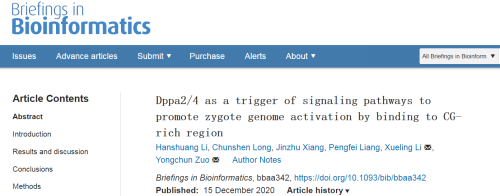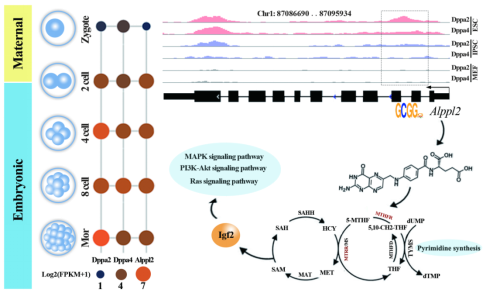On December 15, 2020, two research teams of the State Key Laboratory of Reproductive Regulation and Breeding of Grassland Livestock, College of Life Sciences, IMU, which are respectively led by Professor Zuo Yongchun and Professor Li Xueling, published a research paper named Dppa2/4 as a trigger of signaling pathways to promote zygote genome activation by binding to CG-rich region in Briefings in Bioinformatics(Problem-solving protocol section)-a world top journal of bio-information. The article describes at great length the bio-pathways of molecules activated by Dppa2/4-regulated embryonic genome.

Life of mammals originates from the combination of sperms and eggs. As zygote comes into being, mNRA begins to degrade and embryonic genome transcription expression starts. The process is called EGA(embryonic genome activation) or ZGA(zygotic genome activation). EGA is the first key concerted molecular event in the development of an embryo. The targeted activation in the process is significant for the normal development of embryos. With the research going on, several decisive ZGA triggers were well identified, such as the transcription factor (TF) Dux, expressed exclusively in the minor wave of ZGA, and discovered to further bind and activate many downstream ZGA transcripts including Zscan4c and endogenous retrovirus MERVL. With the role of Dppa2 and Dppa4 in ZGA widely focused on, more and more studies have identified the role Dppa2/4, as the upstream trigger of Dux, plays in ZGA activation. However, we have no clear idea about how Dppa2/4 drives the complicated ZGA transcription and whether they have coordinated regulation.

This study identifies what role Dppa2/4 plays in ZGA and discovers that by binding on CG-rich region of proximal promoter (0–500 bp), Dppa2/4 can also dramatically trigger most signaling pathways including the decisive signaling pathways for facilitating ZGA such as Hippo, MAPK and TGF-beta signaling pathways and so on. In addition, Dppa2/4 plays a cooperative regulatory role in regulating cell pluripotency and simultaneous overexpression of Dppa2/4 can make induced pluripotent stem cells closer to embryonic stem cells (ESCs). We found alkaline phosphatase, placental-like 2 (Alppl2) was completely silenced when Dppa2 and 4 single-or double-knockout in ESC, which is consistent with Dux-a downstream target gene. This proves that Alppl2 may be another new downstream factor except Dux. As is shown by immunofluorescent staining, Alppl2 was significantly activated in mouse 2-cell embryos, which further predicted that that Alppl2 was directly regulated by Dppa2/4 as a ZGA candidate driver to facilitate pre-embryonic development.
Professor Zuo Yongchun and Professor Li Xueling are correspondent authors of this article. Li Hanshuang, a master student of Grade 2, Long Chunsheng, a master student of Grade 3 and Xiang Jinzhu, instructor, are the co-authors of the paper. This research was supported by the National Natural Science Foundation of China (grants 62061034, 61702290 and 61861036); Program for Young Talents of Science and Technology in Universities of Inner Mongolia Autonomous Region (grant NJYT-18-B01); and the Fund for Excellent Young Scholars of Inner Mongolia (grant 2017JQ04).Link address for the paper is as follows.
https://academic.oup.com/bib/advance-article/doi/10.1093/bib/bbaa342/6034044#219369022

